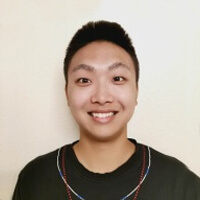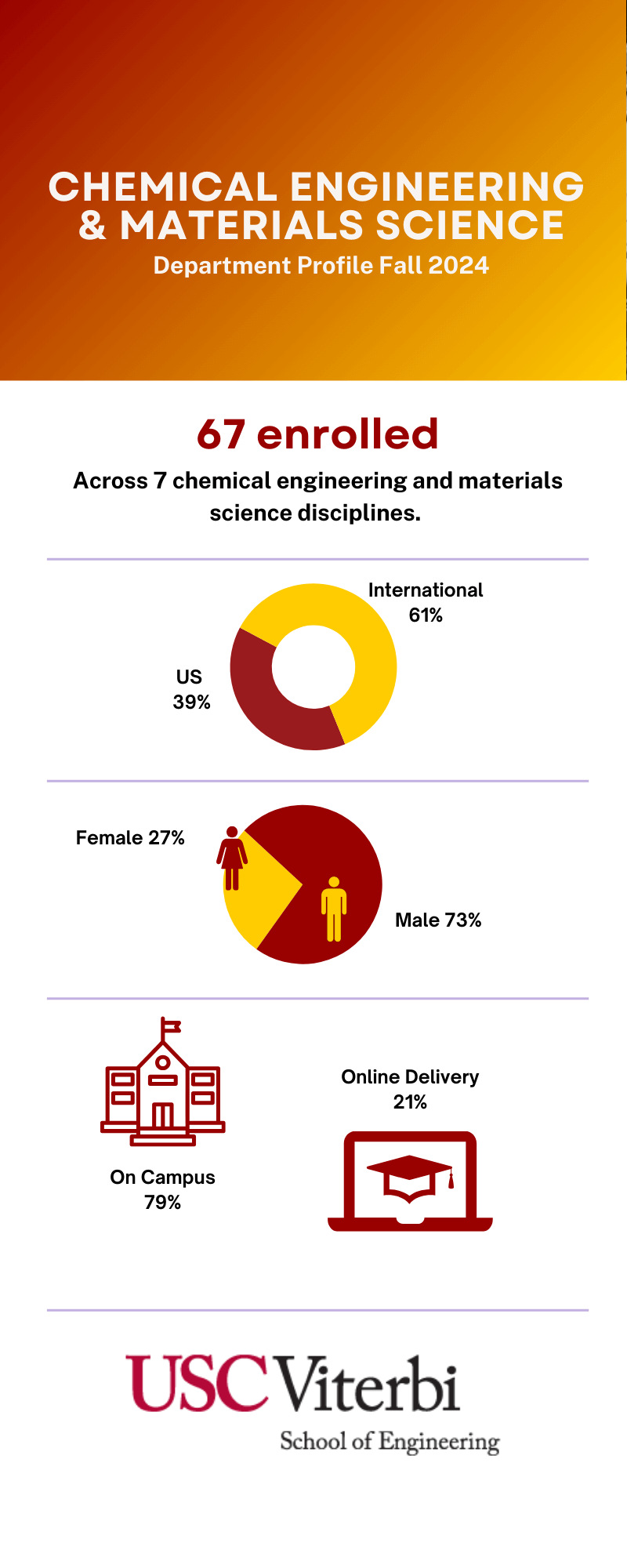Students with an interest in the characterization, selection and processing of engineering materials, and in materials problems related to engineering design may work toward a MS in Materials Science and Engineering.
This degree is awarded in conformity with the general requirements of the Viterbi School of Engineering. Students may elect to work for this degree in either the Materials Science or Aerospace and Mechanical Engineering departments.
The specific courses that constitute an acceptable program must be approved in advance by the administering department.
International Students: This program is eligible for the OPT STEM extension.
- This program requires completion of 28 units of coursework
- Thesis option and Directed Research (research without thesis) may be requested after completing first semester. Thesis option is not guaranteed
- USC Catalogue
- USC Schedule of Classes
APPLICATION DEADLINES
| SEMESTER | DEADLINE |
| Spring | September 1 |
| Fall | December 15 |
Visit our Ready to Apply page for more information
ELIGIBILITY CRITERIA
Applicants to the Master's of Science in Materials Science and Engineering program are required to have a bachelor’s degree or be in the process of completing a bachelor's degree. Degrees in any engineering or engineering-related disciplines are frequently represented among our program applicants, including but not limited to the following:
- Chemical Engineering
- Chemistry
- Civil Engineering
- Electrical Engineering
- Materials Engineering/Science
- Mechanical Engineering
- Material Science
- Physics
Applications are reviewed holistically; simply taking these courses does not guarantee admission.
APPLICATION REQUIREMENTS
The following materials are required to be included with your online application:
- Transcripts
- Resume/CV
- Personal Statement
- Letter of Recommendation (Optional)
NOTE: The GRE is not required for 2026 applications.
The following link will take you to an overview of the tuition & fees for graduate engineering students, including payment information. Both on-campus and DEN@Viterbi students pay the same tuition
TUITION AND FEES OVERVIEW
Use the link below to download the Cost of Attendance to see a summary of tuition and fees by semester. The document is a typical example and the number of courses, and time to complete the program, will vary by student.
Estimated Cost of Attendance - 28 Unit Program
 AOYAN LIANG
AOYAN LIANG
Tell us a little bit about yourself
I am from Shandong, China and received my bachelor’s degree in Materials Science at Southwest Jiaotong University in Chengdu, China. Then I pursued my master’s degree in Materials Science at USC. Now I am an upcoming USC PhD student in Materials Science.
What sparked your interest in chemical engineering?
I love doing research and enjoy the sense of achievement when I make progress and breakthroughs. Before coming to USC, all my research was completed experimentally and I had no experience in atomistic simulation. Because materials science has so many branches, like semiconductors, metals, and polymers, I was hesitant to choose just one of them at that time. But after taking some courses and doing some research regarding computational materials, I decided to concentrate on computational materials in my Ph.D. program. Here are two main reasons why I chose these materials.
First, I found that atomistic simulations were extremely practical and promising since they were time-saving, cost-effective, and more secure than experiments. For example, when I was working at Professor Rehan Kapadia’s lab at USC, poisonous gas needed to be used for chemical reactions. To find the best growth condition for indium phosphide (InP) and indium arsenide (InAs), we needed to try different condition parameters. Once the trial failed, the samples were wasted, and it took a couple of hours to prepare for a new trial. But as computational power has increased, researchers can simulate the chemical vapor deposition (CVD) process to find the best preparation conditions to replace the time-consuming process of trial and error.
Secondly, although atomistic simulations are limited by the system size and simulation time, they can probe into the atomistic scale and provide people with explanations and understandings of unaccountable phenomena. The simulations can even help people discover previously unknown properties of materials as well as invent new ones.
What attracted you to choose USC for your graduate studies?
The research in Professor Paulo Branicio’s lab at USC matches my interest. Professor Branicio mainly focuses on simulating materials under extreme conditions, high strength ceramics, and phase change materials by using atomistic simulation. I joined professor Paulo Branicio’s lab working on atomistic simulations of field-assisted sintering (FAST) of nanoceramic, in which simulations were performed with our in-house parallel molecular dynamics Fortran codes. The Center for High-Performance Computing (HPC) at USC was another attraction for me, as it provides me the opportunity to run a large-scale and prolonged simulation. Also, I like Los Angeles, where the weather is perfect.
Tell us about some exciting and unforgettable incidents from your time so far at USC.
My research advisor, Professor Paulo Branicio, invited me and his group members to a barbecue in his house last summer. We celebrated the end of summer and had some tasty grilled meat, which was an exciting and unforgettable time for me. Also, Professor Paulo Branicio is such a nice person who is always supportive and encouraging. Working with him is a great experience for me. That’s another reason why I chose to continue my academic life at USC.
2022 First Destinations Survey - Outcomes*

Alumni Employment - 2022*
(Companies & Job Titles)
-
Applied Materials, Inc. - Process Support Engineer
-
Glidewell Dental - R&D Engineer
-
Headway - CMP process development engineer
-
Stryker Corporation - Engineer
.
.
.
* Information is based on a voluntary survey and should not be interpreted as a comprehensive view of the 2022 graduating class.
Available Online
This program is also available online through DEN@Viterbi. DEN@Viterbi students undergo the same academic requirements, curriculum, and must adhere to the same academic standards as on-campus students; therefore, the diploma issued by the University of Southern California is the same. There is no difference between remote students and on-campus students.
Limited Status
If you are interested in beginning classes as a DEN@Viterbi student next semester, explore the requirements and steps to enrolling as a Limited Status Student.
State Authorization
Prior to enrolling in classes, DEN@Viterbi (online) students need to confirm that their academic program is authorized by their state for online delivery. Please confirm by reviewing the approved program lists, by state, on the DEN@Viterbi State Authorization webpage.
If you have any questions about a specific state or academic program, please email denstateauth@usc.edu.
Learn More About DEN@Viterbi
Please complete the following form for more information.



